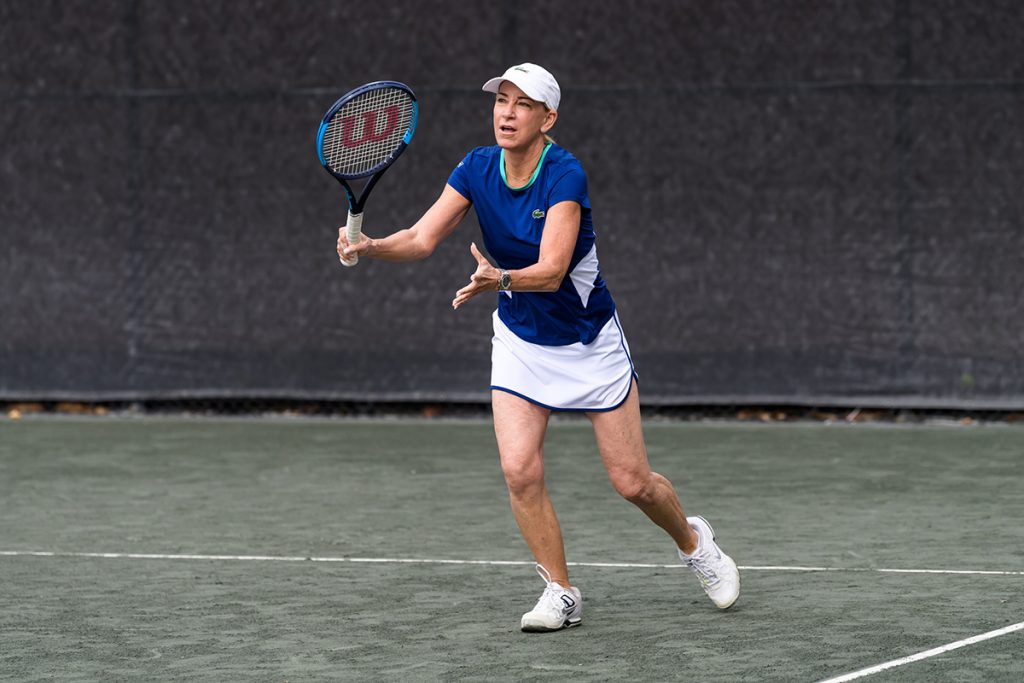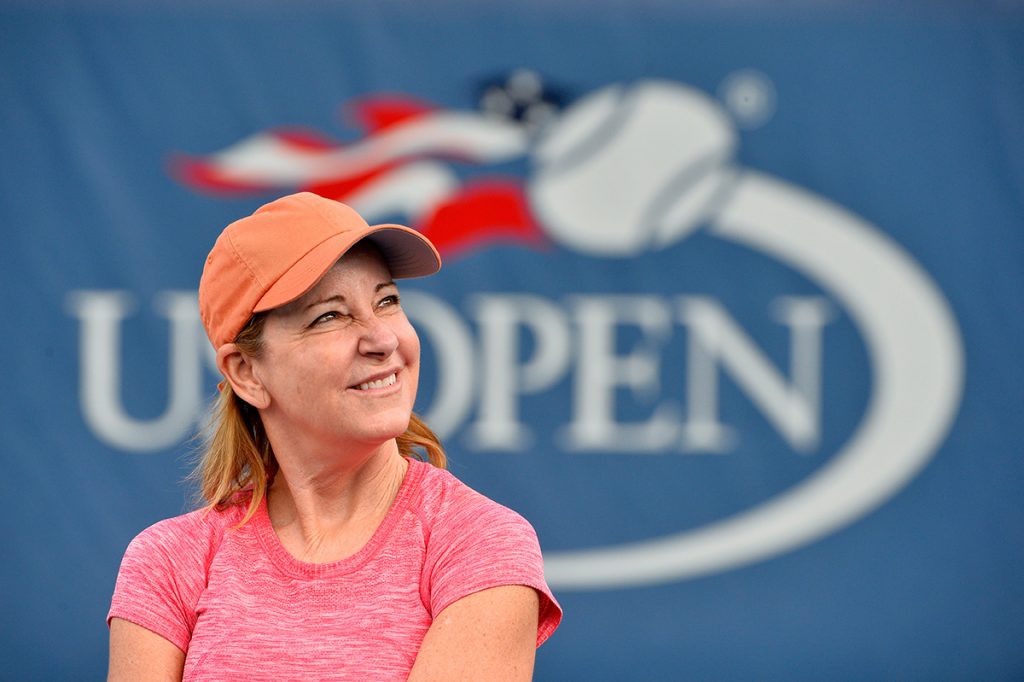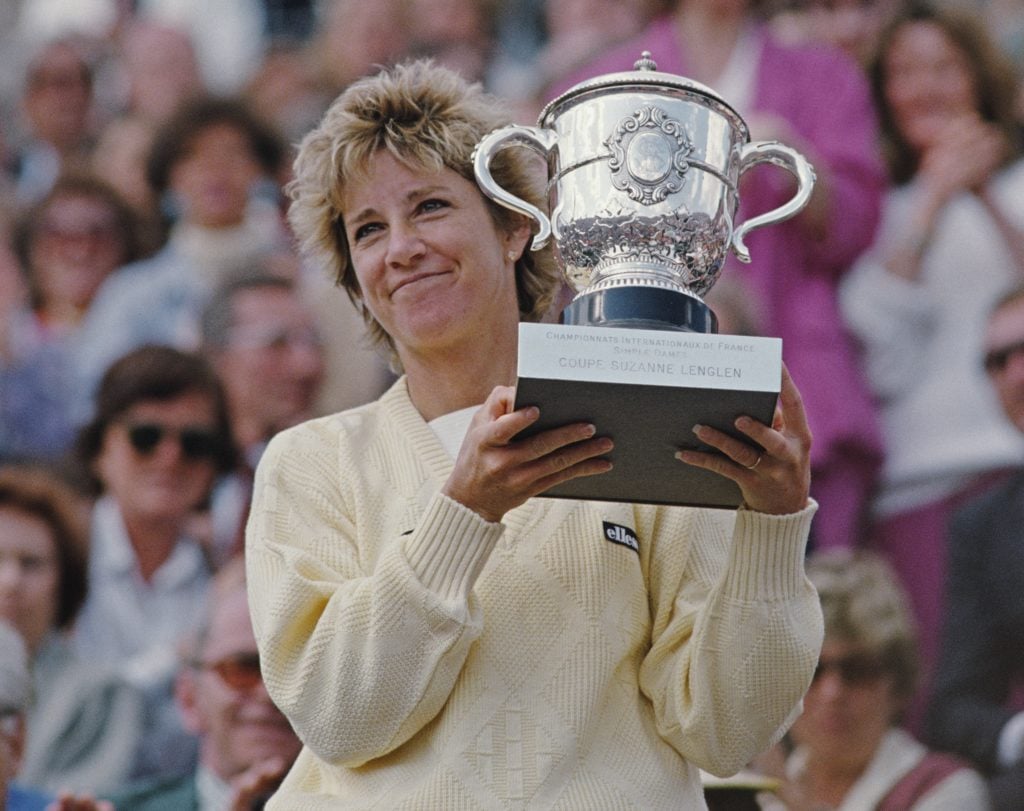Reclaiming Her Joy
- Tennis legend Chris Evert, 66, six months after announcing that her ovarian cancer had come back, returned to Wimbledon to resume her ESPN sports commentator duties after beating ovarian cancer for the second time — and is hanging out with Tom Cruise as an added bonus in the process.
- In an interview last month, Evert shared her mindset after going through cancer twice, and all she looks forward to as she gains her vitality back by working out, holding her grandson and resuming her career.
- Around 80% of women who are diagnosed with ovarian cancer respond positively to their first round of treatment and go into remission. However, a majority of that 80% will experience a recurrence, meaning their cancer will come back.
- Facing a cancer recurrence can be devastating, but know that there are more promising ovarian cancer treatments than ever before that can help even after cancer has returned. Never give up hope.
“Sometimes….You gotta just post a pic with Tom Cruise….🤷♀️🤷♀️🤷♀️,” Evert captioned the epic shot with the A-list star, 62, along with her younger sister Clare Evert-Shane, adding some blonde “shrug emojis” to emphasize her post.
Read MoreView this post on Instagram
This fun moment captured under bright blue skies at the famed tennis tournament comes after an uplifting interview Evert had with the New York Times last month, where she updated fans about her disease-free status and also gushed over becoming a grandmother for the first time.
“I’m in love with this baby boy already,” the mom of three boys said of Hayden James, her son Nicky and his wife Rebecca’s first child, born in May. “It makes me want to live even more.”
View this post on Instagram
Though Evert shared that she is now disease-free again, she is logical about her overall risk.
‘My Doctor Told Me I Won’t Die from This’
“Doctors are always hopeful. Obviously, if something returned the second time, there’s more of a chance that it’s going to return,” said Evert, who lost her sister and fellow tennis pro Jeanne to the same disease in 2020. She was 62.
“Some people have cancer once and it goes away, and they live for 30 or 40 more years. That’s a wonderful story. It’s not always like that.
“But my doctor told me I won’t die from this,” added Evert, a winner of eighteen Grand Slam singles tournaments over the course of her career, three of which were at Wimbledon in 1974, 1976 and 1981.

Though Evert, who had surgery in December, admitted she felt “like crap” for the first four or five days of her chemotherapy treatments and suffered from bone aches, as many patients report, she gained a little strength back and felt “OK” for a little over two weeks before her next infusion.
“With the improvements they’ve made with chemo over the last 25 to 30 years, I can’t complain.”
An Allergic Reaction to Chemotherapy
However, Evert had to forego her last two treatments due to an allergic reaction, describing that her tongue swelled and she had a hard time breathing. Thankfully, after just four chemo sessions, doctors determined that her cancer was gone. Evert’s continued treatment consists of four daily pills taken for the next two years.
When Your Body Rejects Traditional Chemotherapy
Now on the mend — again — the former Olympic athlete is focused on getting her energy and vitality back. Evert is enjoying working out, holding her grandson, and of course, continuing her legendary career, including plans to cover the US Open after Wimbledon.
“You can’t live in fear,” the hall-of-famer noted. “I just have to keep exercising, try and be as healthy as I can, and be up on all my CT scans and my appointments with the doctor.”
Chris Evert’s Cancer Journey
Evert first revealed she was diagnosed with stage 1 ovarian cancer in 2022. After undergoing treatment, she reached remission as no evidence of the disease was present during scans at the time. However, when dealing with ovarian cancer, there is a high chance of recurrence despite initial treatment.
Evert announced in December in a joint post with ESPN on X.
“I wanted to give you all an update. My cancer is back,” she wrote, explaining why she would not be a part of ESPN’s 2024 Australian Open coverage. “While this is a diagnosis I never wanted to hear, I once again feel fortunate that it was caught early.”
A message from @ChrissieEvert
Evert will not be part of ESPN's 2024 @AustralianOpen coverage pic.twitter.com/LKGmKDBNGU
— ESPN PR (@ESPNPR) December 8, 2023
Most women, around 80 percent who are diagnosed with ovarian cancer, will respond positively to their first round of treatment and go into remission. However, of that 80 percent, a majority will likely experience a recurrence, meaning their cancer will come back.
“With ovarian cancer, the standard of care is a very, very effective chemotherapy,” gynecologic oncologist at Arizona Oncology Dr. Dana Chase told SurvivorNet in a prior interview.
“Meaning we give you chemotherapy when you first have your diagnosis of ovarian cancer – 80% chance that you go into remission. So, 80%, I consider pretty good for cancer therapy,” Dr. Chase added.
Coping with Recurrence
Some experts say the number is even a little higher, around 85 percent.
“Unfortunately, for about 85 percent of patients, the disease will come back,” Dr. Kimberly Resnick, gynecologic oncologist at MetroHealth in Cleveland, previously told SurvivorNet.
“For the majority of ovarian cancer patients, their course with ovarian cancer is going to look like a wave, meaning there will be times when the disease rises and when it has to be treated. And then there will be times when they’re in the valley when they’re in remission.”
A Biomarker Test for Ovarian Cancer Patients
A CA-125 test is a measurement of a specific type of cancer antigen, a protein that is found in everyone’s blood. High levels of CA-125 in an ovarian cancer patient can often be a biomarker, a warning signal for your doctor that the cancer may have returned.
Monitoring CA-125 is considered one of the best ways to track cancer recurrence, so it’s important for women who are in remission to stay on top of their follow-up appointments so their doctor can spot a recurrence as early as possible.
Ovarian cancer is sub-categorized into two groups.
- Platinum-Sensitive Ovarian Cancer: Your cancer does not return for more than six months after treatment with platinum-based chemotherapies, like carboplatin and cisplatin.
- Platinum-Resistant Ovarian Cancer: Your cancer returns within six months of treatment with platinum-based chemotherapies, like carboplatin and cisplatin.
“The mechanism that causes platinum resistance will cause someone to be resistant to other chemotherapies, as well. That’s why we’re looking for what we call targeted therapies – precision medicine,” Dr. Noelle Cloven from Texas Oncology-Fort Worth Cancer Center explained.
Treatment Options for Recurrent Ovarian Cancer
Maintenance therapy is continued treatment after the patient finishes their initial treatment. After an ovarian cancer patient completes a round of treatments — such as surgery and chemotherapy — her doctor may recommend some form of maintenance therapy to try and delay possible recurrence. Maintenance therapy can involve taking an oral pill called a PARP inhibitor (a type of targeted cancer drug used to treat ovarian cancer and other types of cancers) every day after chemotherapy and can keep cancer in remission longer.
Ovarian Cancer Treatment Options
Genetic testing helps doctors determine the best maintenance therapy.
“The biggest question is: How do you choose between bevacizumab (Avastin) or a PARP inhibitor for maintenance therapy?” Dr. Alpa Nick, a gynecological oncologist with Tennessee Oncology in Nashville, previously told SurvivorNet.
The drugs have very different ways of combating cancer cells. PARP inhibitors prevent cancer cells from repairing their DNA, while Avastin blocks the formation of new blood vessels, starving tumors of nutrients.

The Food and Drug Administration (FDA) approved bevacizumab (Avastin) to be used in conjunction with olaparib (LYNPARZA) in HRD (homologous recombination deficiency) positive women who show a response to platinum-based chemotherapy. During clinical trials, the drug combination increased progression-free survival from an average of 17 months to 37 months.
“A patient really has to make a decision upfront, or near the beginning of their treatment, that they want bevacizumab maintenance treatment because they’ll have it with their primary chemotherapy,” Dr. Nick explained.
The drug is administered intravenously and can be given in combination with other chemotherapy drugs. Avastin affects the growth of blood vessels, starving tumors of the blood they need as nourishment.
PARP Inhibitor Guidelines
The American Society of Clinical Oncology (ASCO) guidelines recommend PARP inhibitors be offered to women, with or without genetic mutations (Evert carries a BRCA gene mutation), who are newly diagnosed with stage III or IV ovarian cancer and have improved with chemotherapy.
Surgery offers another important decision point. “When patients have their surgery, we can test their tumor to decide if their tumor has a homologous recombination deficiency,” known as HRD. If it does, that also suggests they would benefit from PARP inhibitor maintenance therapy,” says Dr. Nick.

Additionally, Elahere (mirvetuximab soravtansine-gynx) is an FDA-approved targeted therapy providing much-needed hope for patients with platinum-resistant ovarian cancer. This drug treatment is for women who test positive for a molecular factor called folate-receptor alpha (FRα). While many ovarian cancers test positive for the folate receptor, to be eligible for Elahere, you must have very high levels (>75%) of the folate receptor-alpha (FRα).
It is an antibody-drug conjugate. This kind of new anti-cancer drugs, known as “biological missiles,” is leading a new era of targeted cancer therapy.
Learn more about SurvivorNet's rigorous medical review process.

